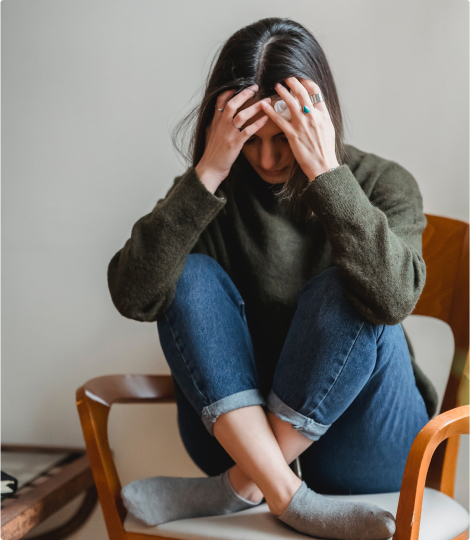Anxiety
Lots of us will experience feelings of anxiety at some time in our lives but if you feel a persistent, overwhelming sense of nervousness, then you may suffer from one of the common types of anxiety.
What is Generalised Anxiety Disorder?
Generalised Anxiety Disorder (GAD) is when you feel anxious in lots of different situations. A key sign of this disorder is if your anxieties do not match your surroundings and it’s difficult to pinpoint your anxiety to a certain situation. Symptoms of this disorder include heart palpitations, sweating and quick & shallow breathing.
Following the last couple of years with the global pandemic, there has been a significant increase in mental health cases, especially for people experiencing health anxiety symptoms. This could be the effects of a new accepted lifestyle where we all doubt our illnesses and symptoms for something more serious.


What is Health Anxiety?
Health anxiety is an obsessive and irrational worry about having a serious medical condition. It is also known as illness anxiety and was formerly known as hypochondria. This condition is a person’s imagination of physical symptoms of illness or a person’s misinterpretation of a normal bodily reaction as something serious linked to a disease or illness. Health anxiety most often occurs in early or middle adulthood and can worsen with age.
Common symptoms experienced by those challenged with anxiety already include headaches and a racing heartbeat. If suffering from health anxiety, then these normal signs are thought of as something more serious and it is important to seek help.
There isn’t any diagnosed reason why people develop health anxiety, but professionals believe that it can stem from a few situations. If you have someone in your family who has worried excessively about their health, then this will have been passed on to you. If you have suffered a lot as a child with serious health conditions, then as an adult you will be anxious about any symptom being something serious.
A person who suffers from health anxiety will have many of these symptoms:
- Constantly worrying about their health
- Frequently checking their body for signs of illness (i.e lumps, tingling or pain)
- Are always asking people for reassurance to tell them they are ok
- Worrying that a doctor may have missed something
- Osessively looking at health information on the internet and comparing their symptoms
- They avoid watching medical TV programmes
- Act as if they are ill to avoid doing things
Different types of anxiety
Anxiety can present amongst many other disorders and in various ways. Other types of anxiety disorders include:
If someone is suffering from this disorder, then they will experience frequent and recurring panic attacks. The person will feel tight chest pains similar to a heart attack, sweating, elevated heart rate and trouble breathing. People will experience at least one panic attack in their life, but someone who suffers from the panic disorder will suffer with them more frequently and it will begin to affect their daily life.
This is where social interactions are the root cause of your anxiety. It might be that you are afraid to present in front of people at work or avoid speaking in groups for fear of being judged. Sometimes the fear is that I will say something that makes me sound stupid or that I will come across as boring. This then interferes with your ability to maintain friendships/ relationships, or even hold down a job. If someone has social anxiety disorder then they will frequently pass up opportunities to mix with other people, will decline invites to events and miss career opportunities at work.
This happens when you have been through a traumatic experience, and you have trouble processing and dealing with what has happened and healing. Symptoms of PTSD include interrupted sleep and nightmares, reliving the experience over and over and avoiding experiences or situations that remind the sufferer of the trauma.
People who experience OCD will have compulsions to complete certain routines or daily rituals for fear that something bad will happen to them or their loved ones if they do not do it. This can include, excessive checking, cleaning, ordering items or mental processes which try to reduce unwanted thoughts. Which is known as pure “O” OCD where there are no visible behaviours. There is a cycle that OCD follows: Obsessions, Anxiety, Compulsions and Relief. Mental health professionals identify OCD as compulsions that cause excess stress in the life of the sufferer.
We hear of this when talking about younger children and their struggle to be separated from their parents for an extended period, but adults can also suffer from this too. Symptoms in adults include worrying about being away from loved ones, a fear of losing a parent and not wanting to leave home due to being separated from loved ones.
Phobias are labelled as irrationality and avoidance in individuals. Most people who suffer from a phobia know that it is not based on reality, but they can’t stop themselves. Phobias can cause difficulties for the sufferer in their daily life and can become very serious.


signs of an anxiety disorder and symptoms
- Excessive and frequent worry
- Frequently anxious
- Feeling ongoing nervousness, restless or tense
- Trembling
- Breathing rapidly (hyperventilation)
- Sweating
- Feeling weak or tired (easily fatigued)
- Headaches and dizziness
- Racing heartbeat
- Irritability and anger
- Sleep difficulties
- Long periods of low mood
Treatment for anxiety disorders
Cognitive Behavioural Therapy (known as CBT) is an evidence-based talking therapy designed to help patients manage their problems by changing the way they think and behave. This popular form of talking therapy is used to overcome many mental health conditions and is most favoured to treat anxiety disorders. Sessions focus on becoming aware of thoughts which lead to anxiety and unhelpful behaviour patterns which can keep you from moving towards a rich and fulfilling life.
All Oxford CBT therapists are clinically trained to guide you through the process at your own pace and comfort. CBT sessions are often quite structured with your therapist setting personalised goals with you to help work through the problems that are causing symptoms of anxiety. This is so that you both know what you are working towards in your sessions. At the start of most sessions, you will set an agenda together and agree on what that session will concentrate on.
NICE guidelines recommend that Individual CBT for GAD will typically consist of 12–15 weekly sessions (fewer if the client recovers sooner; more if clinically required), each lasting 50 minutes to 1 hour.
CBT treatment for anxiety will involve some of the following:
- Developing an understanding more about the normal range of bodily feelings that most people experience
- Talking about and considering different interpretations of your experiences
- Working with your thoughts and images
- Experimenting with what happens when you reduce how often you check and seek reassurance
- Deliberately exposing yourself to your worries
Clinicians who specialize in treating Anxiety
Our team of qualified clinicians specialise in helping people with all forms of anxiety. This includes Panic Attacks, Social Anxiety, Health Anxiety, Obsessive Compulsive Disorder (OCD), Sleep Problems, work stress and PTSD.
Take a self-assessment for anxiety
Complete screening questionnaire and we will connect you with a therapist according to your needs and requirement criteria.

















